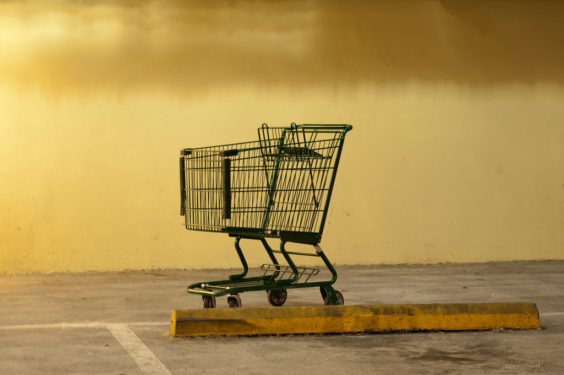From groundhogs to Presidents, Valentines to Mardi Gras – for such a short month, February sure has its share of celebrations. But don’t let the month come to a close without marking one of its lesser-known occasions. Because February is “National Return Shopping Carts to the Supermarket” month. Really.
It’s not quite a holiday, created by presidential proclamation. It’s more of an awareness-raising event, created by a frustrated grocer. Anthony Dinolfo launched the event back in 1969, the year that Neil Armstrong walked on the moon (“I wouldn’t be surprised if he found a shopping cart in one of the craters,” Dinolfo once told an interviewer.)
Dinolfo estimated that he lost up to $100 every time someone walked off with a shopping cart from his Sparkle Food Center in Chicago. The value of a typical shopping cart is about twice as much today. Some reports say nearly 2 million shopping carts are stolen each year, costing the average store as much as $10,000 a year to retrieve or replace them.
But in various interviews before his death in 2009, Dinolfo seemed less upset about the monetary loss, than about the indignity that befell the stolen shopping carts. “I have seen them used as laundry baskets in people’s basements,” he once lamented to the Chicago Tribune. “Newspaper carriers,” he went on, “I tell you, newspaper carriers – delivering their papers in shopping carts that were taken from a grocery!” And he had even heard that “people use stolen shopping carts as barbecue pits. I mean it!”
You certainly can’t accuse him of not being passionate about his cause. It’s a passion that others apparently share (read: “Shopping Carts: A Love Story”). Communities across the country have debated the best way to tackle the problem of errant shopping carts blighting the landscape – fine the perpetrators, or hold the grocery stores themselves responsible?
The issue became a hot topic in Tuscon, Arizona this month, where the city council has created a shopping cart task force. City Attorney Mike Rankin wants to follow the example of one nearby town, and force retailers to install anti-theft devices.
The state of Maryland is considering a different approach. Lawmakers have proposed a bill to raise the fine for stealing a shopping cart from $25 to $100. Environmental groups that support the bill say they regularly find “crazy amounts” of shopping carts clogging waterways. Notably, though, the group says it never finds any shopping carts from ALDI.
ALDI, as those who’ve shopped there well know, makes you insert a quarter to get a shopping cart. And you don’t get your quarter back unless you put the cart back. “With this system,” ALDI explains, “we don’t have to assign an employee to round up carts in the parking lot, we don’t lose expensive carts, and you don’t have to worry about dings in your car doors from runaway carts.” ALDI doesn’t have a 100% success rate, but overall, the company and its customers say the system works quite well.
Never mind $100 fines, then. Apparently the risk of losing a quarter is enough to stop the scourge of grocery cart theft. There are now at least a half dozen ALDI stores within a few miles of the former Sparkle Food Center, where “National Return Shopping Carts to the Supermarket” Month began. So in his own neighborhood at least, if not in the rest of the country, Dinolfo can rest in peace – knowing that his work is done.













Would like the person who wrote this article to contact me, as it was my Father, Anthony Dinolfo that the article was about. Thanks for keeping the message alive. Sal.
I always park close to the shopping cart corral, and I put my cart there when I am finished unloading it. I sometimes put other stray carts in the corral, as well. I fail to understand why others don’t. It’s just basic common courtesy. At Aldi, I always look around to see if there are any abandoned carts. (In the year or two I’ve been shopping there, I’ve only found one.) It’s an easy way to earn 25 cents!